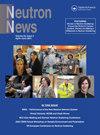一个新的前沿:TOSCA上的高压中子科学
Q4 Physics and Astronomy
引用次数: 0
摘要
英国ISIS脉冲中子和μ介子源的TOSCA中子光谱仪在其研究成果的数量和多样性方面都是一流的。科学领域涵盖了广泛的学科,而且这些学科还在不断发展,从能源材料和工业催化到生物学和制药。复杂的样品环境已经成为仪器上的常规,有一系列气体加药装置和专用的化学反应装置来研究与工业部门直接相关的催化和可持续过程。该仪器还支持非弹性中子散射之外的额外和急需的科学能力,包括同时衍射和拉曼散射。最近的努力还致力于实现原位照明以探索光驱动现象。除了过去的一些(相当英勇的!)努力之外,高压科学迄今为止几乎没有受到关注。高压域一直是中子光谱学的一个挑战,在中子光谱学中,检测到的通量适中,导致克级含氢材料的标准测量时间在几个小时内。TOSCA主光谱仪的最新升级,配备了最先进的中子导向器[1本文章由计算机程序翻译,如有差异,请以英文原文为准。
A New Frontier: High-pressure Neutron Science on TOSCA
The TOSCA neutron spectrometer at the ISIS Pulsed Neutron and Muon Source in the United Kingdom is pro-lific in both the quantity and the diversity of its research outputs. Science areas span a broad range of disciplines and these continue to grow, from energy materials and industrial catalysis to biology and pharmaceuticals. Complex sample environments have already become routine on the instrument, with a range of gas-dosing setups and a dedicated chemical-reaction rig to study catalytic and sustainable processes of direct relevance to the industrial sector. The instrument also supports additional and much-needed scientific capabilities beyond inelastic neutron scattering, including simultaneous diffraction and Raman scattering. More recent efforts have also been directed towards the implementation of in-situ illumination to explore light-driven phenomena. Aside from a handful of (rather heroic!) efforts in the past, high-pressure science has received little-to-no-attention to date. The high-pressure domain has always been a challenge for neutron spectroscopy, where the detected flux is modest, resulting in standard measurement times within the region of a few hours for gram-scale quantities of hydrogenous materials. A recent upgrade of the TOSCA primary spectrometer with a state-of-the-art neutron guide [ 1
求助全文
通过发布文献求助,成功后即可免费获取论文全文。
去求助
来源期刊

Neutron News
Physics and Astronomy-Nuclear and High Energy Physics
CiteScore
0.30
自引率
0.00%
发文量
36
 求助内容:
求助内容: 应助结果提醒方式:
应助结果提醒方式:


